UNESCO’s Memory of the World Programme

Library and Archives Canada (LAC) preserves priceless records, some of which are inscribed in the Canada Memory of the World Register and UNESCO’s Memory of the World International Register. These inscriptions help promote Canada’s collective heritage, both at home and around the world.
In this way, LAC is helping to achieve the three main goals of UNESCO’s Memory of the World Programme: preserving documentary heritage, ensuring universal access to it and raising public awareness about it throughout the world.
Canada Memory of the World Register
The Canadian Commission for UNESCO administers the Canada Memory of the World Register, which highlights the national significance of documentary heritage items, collections or fonds related to Canada and its peoples.
Memory of the World International Register
UNESCO manages the Memory of the World International Register. The documentary heritage it contains is of global significance and outstanding universal value.
LAC inscriptions
- Elsie Gregory MacGill fonds
- Oscar Peterson fonds
- Archives documenting the service of Black Canadians in No. 2 Construction Battalion
- Mary Ann Shadd Cary Archives
- Métis Nation River Lot Settlements Maps
- Selections from the Gospels in the dialect of the Inuit of Little Whale River
- Marshall McLuhan: The Archives of the Future
Elsie Gregory MacGill fonds
Canada Memory of the World Register
Year of inscription: 2026
Joint Nomination: Archives of Ontario and Library and Archives Canada

Portrait of Elsie Gregory MacGill (1946) / e006611177
The Elsie Gregory MacGill fonds highlights the life and achievements of a pioneering aeronautical engineer, business leader, and Canadian feminist. As the first woman to fully design an aircraft—the Maple Leaf Trainer II—she made a significant mark on aviation history. The fonds documents nearly fifty years of her contributions to Canada’s aviation sector, from its early development through the Second World War and into the commercial era. It also illuminates her experiences as a disabled woman in STEM (science, technology, engineering, math) and entrepreneurship, as well as her advocacy for women’s rights, which helped drive legal reforms in Canada. The fonds includes records from her work on the Royal Commission on the Status of Women, technical drawings, photographs from her personal life and career, and personal correspondence.
Resources
Oscar Peterson fonds
Canada Memory of the World Register
Year of inscription: 2025
Nomination: Library and Archives Canada
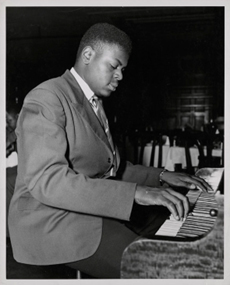
Oscar Peterson, photographed by DC Langford (1944) / e010752610
The Oscar Peterson fonds consists of records that were created and/or accumulated by Peterson throughout his life and career as a professional jazz musician. It includes documents concerning his activities as a touring, performing and recording artist; musical works; honours and awards; and personal matters. The fonds is unique and of distinct value as it provides a permanent record of Oscar Peterson’s creative and recording output, as well as comprehensive primary sources documenting his artistic and professional activities. The sound recordings include live performances intended for broadcast, masters of studio albums, rehearsals and work tapes.
Resources
Archives documenting the service of Black Canadians in No. 2 Construction Battalion
Canada Memory of the World Register
Year of inscription: 2024
Nomination: Library and Archives Canada
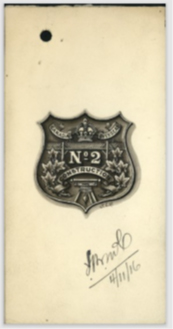
Cap badge of No. 2 Construction Battalion / Library and Archives Canada / e011395922
These records recount the story of Black soldiers who served in No. 2 Construction Battalion—a segregated unit of the Canadian Armed Forces deployed overseas during the First World War, which was headquartered in Nova Scotia. The fully digitized collection consists of the unit’s administrative records, the personal diary of Captain William Andrew White (the battalion’s only Black officer, an ordained Baptist minister and military chaplain) and government military service files of soldiers in the unit. This collection of records supported the efforts of the National Apology Advisory Committee that led to the July 2022 Government of Canada apology for the systemic anti-Black racism that members of No. 2 Construction Battalion endured before, during and long after the First World War.
Resources
Mary Ann Shadd Cary Archives
Canada Memory of the World Register
Year of inscription: 2023
Joint nomination: Archives of Ontario and Library and Archives Canada
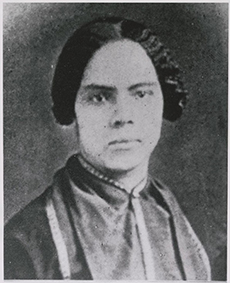
Portrait of Mary Ann Shadd Cary / Library and Archives Canada / e011536885
The records of Mary Ann Shadd Cary—educator, author, feminist, abolitionist, journalist and lawyer—are among the most significant collections of material in North America produced by this pioneering figure or about her life and work. The records capture the energy and ideas that permeated her work as an educator and as editor of the Provincial Freeman, as well as her thinking around the abolition of slavery, Black equality and women’s rights. This documentary heritage demonstrates Mary Ann Shadd Cary’s prominence within various anti-slavery movements. It also offers insight into her position as a free Black woman who came to Canada and helped to give women and Black people in Canada a voice.
Resources
Métis Nation River Lot Settlements Maps
Canada Memory of the World Register
Year of inscription: 2021
Nomination: Library and Archives Canada

Map of river lots in the parishes of St. Norbert and St. Vital, Manitoba / Library and Archives Canada / e011205909
Library and Archives Canada holds plans of Métis Nation river lots as required by the Manitoba Act and the transfer of Rupert’s Land and the Northwest Territories. Created by Canadian government surveyors beginning in 1870, these records are valuable sources of information for understanding the history of the Métis Nation. They are invaluable to the entire Métis Nation because they show the locations where their Métis ancestors lived before their homeland became part of Canada. While these river lot plans do not include any Michif, they clearly show that this language originated in the Red River region and permit the identification of families who spoke this language, which is unique to the Métis culture.
Resources
Selections from the Gospels in the dialect of the Inuit of Little Whale River
Canada Memory of the World Register
Year of inscription: 2019
Nomination: Library and Archives Canada
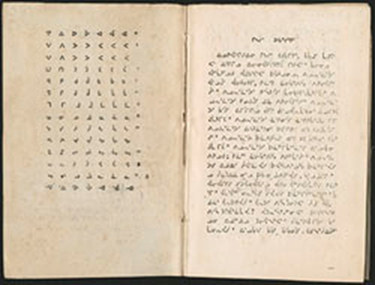
Image of the copy held at Library and Archives Canada
Selections from the Gospels in the dialect of the Inuit of Little Whale River is the first book printed in Inuktitut syllabics. This syllabic writing system is used in two of the four regions of Inuit Nunangat: Nunavut and Nunavik. It has been transformed and modified several times since it was first used in this book over 150 years ago. Just eight pages long, the book was printed in 1855 and 1856 in Moose Factory, Ontario, and was distributed to Inuit in Nunavik by Christian missionaries. The copy in our collections is the only one known to have survived the passage of time.
Resources
Marshall McLuhan: The Archives of the Future
Canada Memory of the World Register and Memory of the World International Register
Year of inscription – Canadian Register: 2017
Year of inscription – International Register: 2017
Joint nomination: University of Toronto and Library and Archives Canada
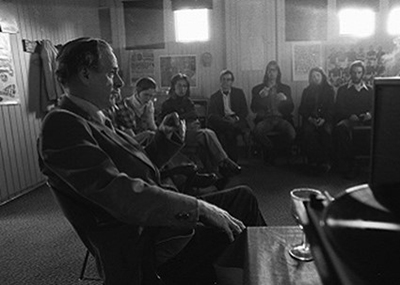
Image of Marshall McLuhan. Source: Robert Lansdale Photography, University of Toronto Archives
Marshall McLuhan (1911–1980) was an intellectual and a cultural theorist whose groundbreaking insights into electronic media changed how we perceive and understand the world today. He coined some iconic expressions, such as “global village” and “the medium is the message,” which are now widely recognized, often quoted (and sometimes misquoted), entrenched in everyday use and officially part of many languages.